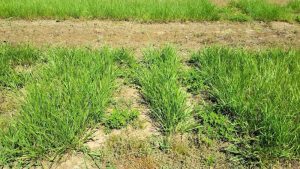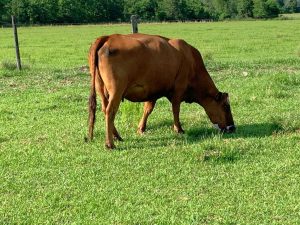Forage production in intensively managed grasslands often requires continuous use of inorganic nitrogen fertilizers. This can be harmful to the environment. Scientists in the UF/IFAS Department of Soil, Water, and Ecosystem Sciences (SWES) studied a sustainable solution to improve the cycling of nitrogen in the soil through microbial activities. This involved adding rhizoma perennial peanut (RPP) into a warm-season grass called bahiagrass. The aim was to reduce the need for inorganic nitrogen (N) fertilizer.
“We wanted to see the impact on the soil’s microbial diversity and communities, especially those responsible for nitrogen cycling, when we mix these plants together,” explained Adesuwa Erhunmwunse, a recent SWES Ph.D. graduate. The research was the focus of her dissertation.

In one of her field studies, where they planted perennial peanut into bahiagrass stands in less than two years, she investigated soil microbes in both spring and fall seasons. Using real-time qPCR measurements and fluorimetric assays, she identified different groups of nitrogen-related microbes and enzymes in the soil. She also used DNA amplicon sequencing to look at the networks of soil microbes.
“The mix of bahiagrass and RPP had more diversity in certain types of microbes,” Erhunmwunse said. “And the activities of some enzymes related to nitrogen were higher compared to having only the RPP.”
“Rhizobiales and Actinomycetales, were prevalent in the bacterial networks, suggesting that members of these bacterial taxa might play important roles in ecological functioning and nutrient cycling in bahiagrass and RPP systems,” she explained.
Fungal & Financial Impacts
Additionally, the RPP influenced an increase in the abundance of specific fungal genera. The researchers found that RPP enhanced the relative abundances of soil fungal genera such as Gibberella, Fusarium, and Humicola. Those are known for their roles in soil organic matter decomposition, N mineralization, and nitrification.
“Overall, the study showed that within a short time of establishment in bahiagrass systems, rhizoma perennial peanut has the potential to influence N cycling activities,” Erhunmwunse said. “It does this by increasing soil prokaryotic diversity and increasing fungal taxa that are responsible for soil organic material decomposition and N mineralization.”

In addition to the environmental impacts, there are financial benefits. Using less fertilizer helps a rancher decrease their input costs. Data from the U.S. Department of Agriculture show the cost of fertilizer hit a historically high price in 2022.
The study was done with grant funding from USDA-NIFA and Southern Sustainable Agriculture Research and Education (SSARE) awarded to Adesuwa Erhunmwunse and her advisor, Sunny Liao, SWES assistant professor of soil microbial ecology.
You can read the full article in the European Journal of Soil Biology here.
 0
0
